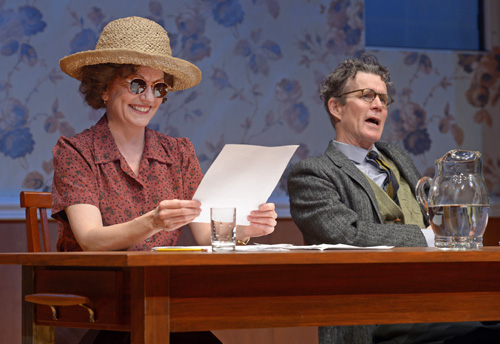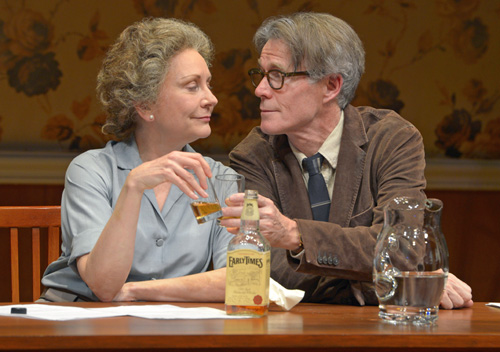
Aspects of literary bonding: words and whisky, shared by Mary Beth Fisher as Elizabeth Bishop and Tom Nelis as Robert Lowell.
Photos courtesy of kevinberne.com

Robert Lowell and Elizabeth Bishop ranked among the most respected and honored American poets of the 20th century: Both won Pulitzer Prizes, both earned National Book Awards, both held the position of Poet Laureate of the United States, both taught at Harvard. They obviously loved words, carefully chosen, written to be read and perhaps preserved for posterity.
Many thousands of those words -- far more than appeared during their lifetimes -- are contained in their correspondence, which filled more than 900 pages when it was published five years ago under the title Words in Air. The volume landed in playwright Sarah Ruhl's hands as a gift, while she was confined to bed during a difficult pregnancy, she told an interviewer. "I couldn't stop reading it," she said.
And she couldn't resist the urge to distill excerpts from that correspondence into a work for the stage. The result, Dear Elizabeth, reached Berkeley Rep's Roda Theater a few days ago. It carries the subtitle A Play in Letters from Elizabeth Bishop to Robert Lowell and Back Again.
Comparisons with the likes of Dear Liar, the sparkling dramatization of epistolary sparring between George Bernard Shaw and the actress Mrs. Patrick Campbell, or Love Letters, A. R. Gurney's amusing and tender fiction, are almost inevitable. As theater, Dear Elizabeth isn't in the same league.
In a bit less than two hours, Ruhl's chosen words -- drawn from the letters and a few better-known poems -- and the staging by director Les Waters attempt to capture the essence of the lives, art and relationship between Bishop and Lowell from their meeting in 1947 until his death in 1977.
That relationship was complex, blending professional respect and personal affection, and at times suggesting something that resembles love, in purely platonic terms. Lowell at one point admits that he had considered proposing marriage: "Asking you is the might-have-been for me . . . the other life that might have been had."
His reticence was undoubtedly for the best. Bishop, played with appropriate restraint by Mary Beth Fisher, was not only Lowell's opposite in temperament and literary approach, but also in sexuality. Her writing focused on the external world, revealing little about herself; her only intimate relationships were with women.
In contrast, Lowell's temperament was volcanic, his mature literary style was confessional, and his intimacies involved three marriages and, according to biographers, a multitude of liaisons. Tom Nelis fills the role with charm and vigor.
Although they met from time to time, crossing paths in some of the many cities that they called home, Bishop and Lowell seem to personify the adage "absence makes the heart grow fonder."
Despite Bishop's lack of verbal candor about personal stresses, except anguish at the death of a long-time partner, Waters's staging makes clear that her mental state was hardly tranquil. We see her swilling whisky straight from the bottle and resorting to medicinal alcohol when she finds her liquor stash empty, though the play gives no indication of whether this was a long-term issue or a brief, dark interlude.
Lowell wrote without inhibition about his emotional struggles, which included not only alcoholism but several mental breakdowns that resulted in hospitalizations. Ruhl treats the episodes with lucid excerpts from his letters, mixing passion and sardonic wit; Waters treats them not only with vitality in Nelis's delivery but also with silence, having the actor slump to the stage and lie flat on his back. The posture is precisely the same that he employs for Lowell's death from a heart attack, suffered in a New York taxi.
I found it impossible to be unmoved by the moment, made clear by Bishop's words in a short epilogue, or to be untouched a few minutes earlier by Fisher's recitation of One Art, which begins "The art of losing isn't hard to master," but dramatic engagement is a rare quality throughout most of the play.
It's no surprise that Bishop and Lowell come through as masters of the art and craft of communication with clarity and often with beauty, but is that enough to make a sojourn with them compelling or interesting? I fear not.
Dear Elizabeth runs through July 7 in Berkeley Rep's Roda Theater, 2015 Addison St., Berkeley. Tickets cost $29-$77, from 510-647-2949 or www.berkeleyrep.org